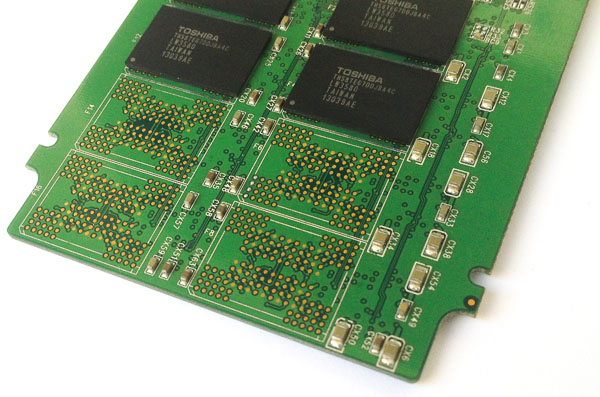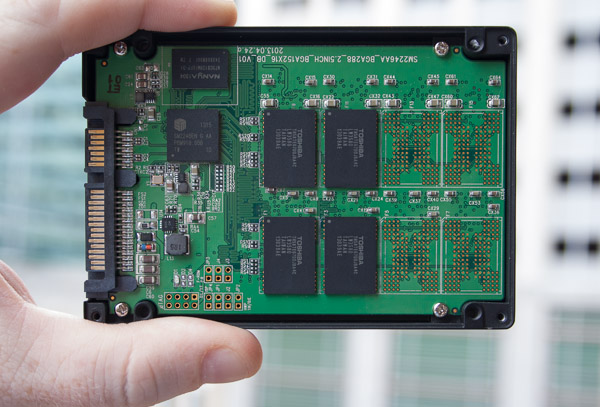Hands-On With Silicon Motion's New SSD Controller
Silicon Motion already makes flash storage controllers in all shapes and sizes. Now, with a new SATA 6Gb/s processor ready for action, the Taiwanese firm is hoping to make a dent in the market share currently enjoyed by SandForce and Marvell.
Silicon Motion Kicks The Tires And Lights The Fires
The drive we received from Silicon Motion requires a bit of context before we start drawing conclusions. You can't run out and buy one of these right now, even if you wanted to. And without knowing how the SM2246EN controller will be used, it's difficult to speculate about how a retail drive would compare to this reference platform.
On the other hand, these processors are being manufactured now, and it's possible that drives with Silicon Motion's controller could start materializing soon. As of right now, we just don't know which companies are experimenting with the Taiwanese firm's hardware.
What we do know is that the SM2246EN behaves really well when it's paired up with high-end Toshiba Toggle-mode NAND. Silicon Motion appears to achieve the great active power consumption it was aiming for, while simultaneously squeezing a ton of performance from a four-channel controller. The processor features TCG Opal encryption, advanced ECC, and a bevy of other features important in newer SSDs.
Conversely, supporting just eight dies per channel, Silicon Motion's controller is limited to just 256 GB with 64 Gb flash. It's possible that an eight-channel version might come along to enable greater performance and capacity, but as they say, you have to crawl before you walk. Even now, with two relatively inexpensive 1000 GB drives on the market, high-capacity mainstream drives are still a ways off. If you purchase a $1000 laptop, upgrading to a 1 TB-class SSD would add an additional 60 to 70 percent of the price. I'd sure as heck do something that crazy, but most SSDs in notebooks are still in the 128 to 256 GB range. Thus, starting off with a well-rounded four-channel solution able to drive up to 256 GB of NAND (or 512 GB using higher density) is a smart opening salvo.
If nothing else, a new third-party controller is a great way to inject some fresh energy into the SSD space. We do know of some new processors that'll emerge from familiar names in the new future. So, it'll be interesting to see how drives built around the SM2246EN fare when they're faced with powerful new competition in the days to come.
At the end of the day, our reference platform based on Silicon Motion's SM2246EN is only representative of itself. That means some of the controller's characteristics will make it through no matter how it gets packaged. It'd be fair to bet that great power characteristics will persist, no matter what. In terms of speed, though, that'll depend on the flash accompanying this processor. We're having a hard time imagining premium products based on a four-channel design, instead of a more value-oriented solution. Our sample, as configured, would probably sell for more than $1/GB, so keep that in mind as you look back on the benchmark results. Whatever happens, though, we're happy to see another player emerging in a market that was slowly consolidating. And of course, our labs love testing upcoming devices before they show up as retail products.
Get Tom's Hardware's best news and in-depth reviews, straight to your inbox.
Current page: Silicon Motion Kicks The Tires And Lights The Fires
Prev Page Results: Power Consumption-
rolli59 Performance looks good, the question is with a new player on the market if it will affect market price to the benefit of users that have SSD boot/program drives up to 256GB.Reply -
4745454b While performance wasn't the best, it was more then acceptable. And then the power numbers looked great. Overall it's a great start. I'm interested in long term results as some controllers have had bugs in the past that have done bad things to people's data.Reply
And yes, great to see someone else enter in. While more players means you'll need to look harder at what SSD you are buying, at least we'll have the options. Which is always good, even if the options aren't as good as what you were hoping for. -
shin0bi272 Not that this isnt kinda cool but Taiwan is now part of China so its proper to call it China.Reply -
UmeNNis Reply11339051 said:Not that this isnt kinda cool but Taiwan is now part of China so its proper to call it China.
Ummm..... how exactly is "Taiwan now part of China"...?:sarcastic: -
mayankleoboy1 During the benchmarks, did you ensure that the Samsung EVO is not throttling due to high temps ?Reply
Maybe add a max temperature graph as well. -
e-z e Given time to mature this could be a real contender. Would love to see a follow-up once it hits the market.Reply -
zads Reply
If only this were the case, my job would be so much easier.11337088 said:Meanwhile, SandForce is the opposite. It'll sell you a turnkey solution, but you don't really get many knobs or dials in terms of customization.

